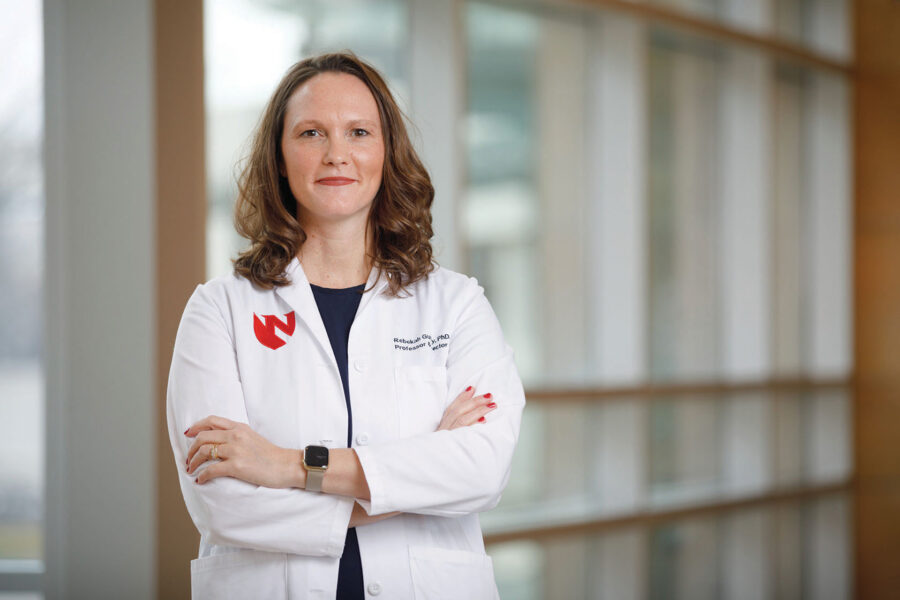The University of Nebraska Medical Center boasts a formidable cohort of women who drive scientific exploration and advance modern medicine in Nebraska and beyond. These visionary researchers and innovators are propelled by grit, resilience and personal resolve to “find a better way.” Among them: Beth Beam, PhD; Rebekah Gundry, PhD; Breanna Hetland, PhD; and Hongying “Daisy” Dai, PhD.
They were featured in the 2024 spring edition of UNMC Connect. See the online version of the publication at this link.
Bullies, Fireflies & Rhino Skin
As Rebekah Gundry, PhD, reflects on her journey from middle school misfit to distinguished biomedical researcher, three character-defining elements come to light: bullies, fireflies and rhino skin.
Growing up in rural Wisconsin, she didn’t conform to the typical “cool kid” narrative. “I never hung out at the mall or friends’ houses or went to parties,” she said. Her towering height and academic focus only served to set her further apart from her peers.
“I was weird. I never fit in,” she said, revealing the harsh realities of middle school bullying that continued into high school. Despite the torment, she emerged with resilience. “The experience gave me the rhino skin I needed for challenges later in life.”
Raised in a conservative household with two older brothers, Dr. Gundry found her passion in science and nature and in studying how things worked. Her mother, knowing the misery at school, encouraged independent activities, such as 4-H and the Sigma Firefly Scientists Club, where a chemical company paid youths to catch fireflies and send them in for bioindustrial research.
“I spent 99% of my time outside,” Dr. Gundry said. Fireflies were a fascination because of their light- producing ability. “Just thinking about sending them in for research and having an impact somehow, somewhere seemed extraordinary.”
Her passion for STEM deepened in high school, especially after a perfume-making lab. “We started with these terrible-smelling chemicals called ethers. I thought that was the coolest thing ever.”
Engaging in Science Olympiads, tackling puzzles and word problems and bonding over episodes of “Unsolved Mysteries” with her mom were favorite activities. Today, “Forensic Files” is the must-watch TV series in the Gundry household.
In 1999, biochemistry and molecular biology became her focus at Marquette University in Milwaukee. The groundbreaking use of DNA evidence in the O.J. Simpson trial at the time inspired her to pursue a master’s degree in forensic science at George Washington University in Washington, D.C.
Drawn to a career as a forensic scientist, she conducted her thesis research at the high-profile FBI Forensic Science Research Unit in Quantico, Virginia. However, she soon realized the downside of such a specialized path: It was overly confining for her aspirations. “I didn’t want to be pigeonholed as a scientist.”
“I don’t understand the pigeonholing of scientists. How much does it matter what your specialty is, if you love all science and can help others grow?”
– Rebekah Gundry, PhD
A PhD in pharmacology promised a broader path.
During post-doctoral studies at the Johns Hopkins University School of Medicine in Baltimore, Dr. Gundry’s interests took an unexpected turn while working in a mass spectrometry lab.
With applications spanning forensics, cardiac studies and cancer research, mass spectrometry offered the breadth of possibilities Dr. Gundry sought in a STEM career.
A postdoctoral fellowship at Johns Hopkins, from 2006 to 2010, provided an opportunity to utilize mass spectrometry in cardiovascular research, supported by funding from the National Institutes of Health. In 2009, Dr. Gundry received an NIH Pathway to Independence Award for her findings from the National Heart, Lung and Blood Institute.
She was 34, married and mom to 16-month-old Jack when she joined the faculty at the Medical College of Wisconsin in Milwaukee in December 2010.
“This was never, ever on my radar,” Dr. Gundry said of the assistant professorship that her mentors and colleagues encouraged her to accept. “Once I got there (academia), I realized I would have been miserable doing anything else.”
Still, it was a challenging first year, living apart from her husband, building her syllabus and establishing a lab from scratch. “I was a single mom for all intents and purposes,” until Larry, still in Baltimore, was able to join her.
A second son, Cedric, arrived in 2012. Despite a difficult pregnancy, she persevered, continuing to publish papers and write grants.
Early in her career, she won accolades as a young investigator, graduate student educator and medical school instructor.
“Our family benefited from my husband transitioning to a stay-at-home-dad,” she said.
Dr. Gundry’s passion for exploring new scientific frontiers is reflected in her roles as Stokes-Shakelford professor and chair of the UNMC Department of Cellular and Integrative Physiology, and director of the UNMC Center for Heart and Vascular Research.
The Gundry Research Group at UNMC studies how molecules in the human heart change in disease. The lab also develops tools and reagents to promote stem cell technologies for improved drug testing and disease modeling.
“For my own lab’s direction, I get most excited about finding something unknown and thinking about what technology we can invent to enable us to uncover even more,” Dr. Gundry said.
Being named a UNMC 2021 Distinguished Scientist validated her lab’s work and “gave me a sense of belonging.” And being named UNeMed’s Emerging Inventor of the Year in 2023 created another layer of gratification.
When pondering leadership opportunities in heart and vascular research and physiology in 2022 and 2023, Dr. Gundry came to a realization: A department chair’s responsibility isn’t primarily focused on their own scientific expertise. Instead, it entails leveraging the diversity of talent within the department and fostering growth.
Success aside, she still needs her rhino skin. “The reality is that I fit everywhere, and I fit nowhere,” she said. But she’s good with that. “I’m my own limitation.”

Inspiring story! Thanks for sharing.